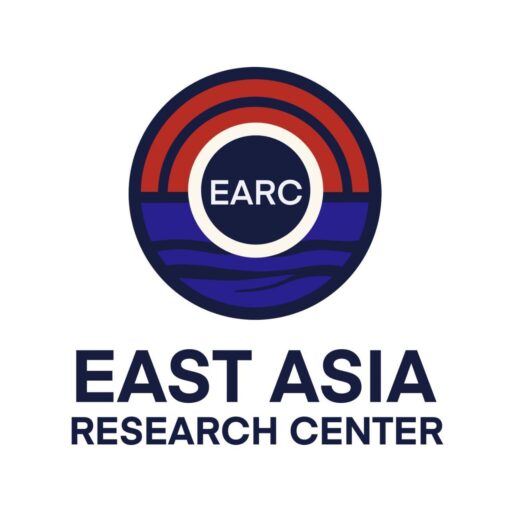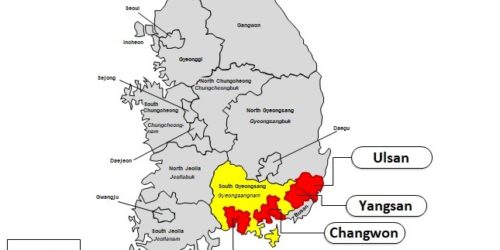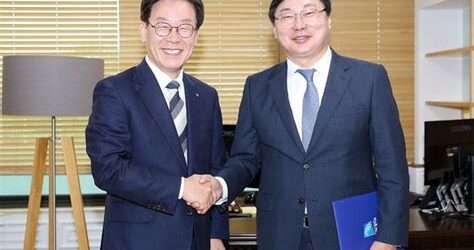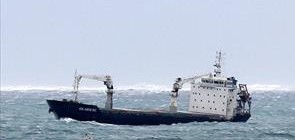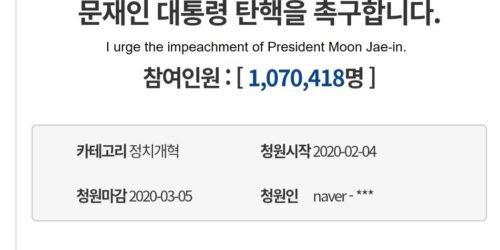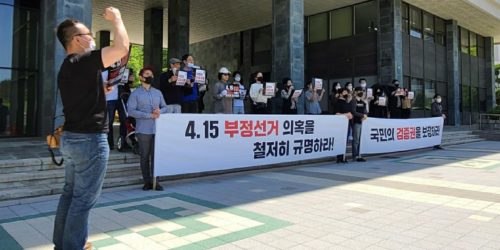Korean Workers’ Party Changed Its Goals? No, It’s Terminology Confusion Tactics
2021-6-4, Tara O
The 8th Party Conference of Nodongdang [Korean Workers’ Party (KWP) or Workers’ Party of Korea (WPK)] was held in Pyongyang on January 9, 2021. An article in Hankyoreh newspaper in South Korea claimed that due to wording changes, North Korea has now given up its objective of inciting a revolution in South Korea to create a united communist Korea under the Kim regime’s rule, and that this is a fundamental change. The article further suggests that this “deletion” would help justify the abolition of South Korea’s National Security Law, a measure supported by the North Korean regime, the ruling Deobureo Minju Party (Democratic Party of Korea), and the Moon administration, but strongly opposed by those who see North Korean threats that have not dissipated, whether it be nuclear, cyber, espionage, subversion, etc. Comparing the past wording changes and reviewing a North Korean dictionary and publications will show there is no change in KWP’s underlying ideology and goals. Rather, the Kim regime is using the age-old tactics to confuse and deceive its targeted audience using words–the “Terminology Confusion Tactics” (TCT) or sometimes referred to as the “Terminology Deception Tactics” (TDT). For another example of TCT (TDT), see here.
Let’s compare what the changed words are. Here is a translated version of Dr. Yoo Dong-ryul’s comparison chart. Dr. Yoo Dong-ryul, the head of the Korea Institute for Liberal Democracy, has been a specialist of North Korea for 25+ years, mostly at South Korea’s National Police Agency’s national security section.
Korean Worker’s Party of Congress Preface Changes
| Party Congress | KWP Objectives (Preface to the Party Convention) |
| 1980-10-10, The 6th (Kim Il-sung) | The current objective of the Party is to achieve a total socialist victory in the northern half of the Republic and complete the task of Minjok Haebang (National Liberation) and Inmin Minju-juui Hyeokmyeong (Proletarian Democratic Revolution / People’s Democratic Revolution) on the countrywide scale, and the ultimate objective is to imbue Juche Ideology and construct a communist society in all of the societies. |
| 2010-9-28, The 3rd (Kim Jong-il) | The current objective of the Party is to construct a socialist Strong and Prosperous Great State in the northern half of the Republic, to execute the task of Minjok Haebang (National Liberation) and Inmin Minju-juui Hyeokmyeong (Proletarian Democratic Revolution / People’s Democratic Revolution) on the countrywide scale, and the ultimate objective is to imbue all societies with Juche Ideology in order for inmin daejung (proletariat masses / working class masses) to completely realize their independence. |
| 2021-1-9, The 8th (Kim Jong-un) | The current objective of the Party is to construct a Rich, Powerful, and Civilized Socialism in the northern half of the Republic, to realize independent and democratic progress of the society on the countrywide scale, and the ultimate objective is to construct a communist society, in which the inmin (proletarian) ideals are completely realized. |
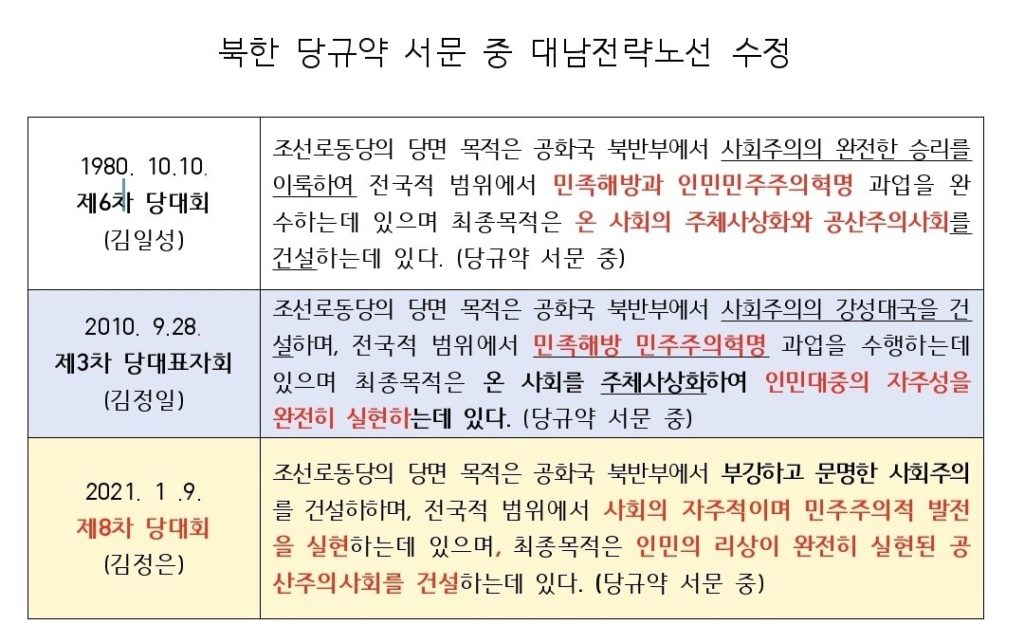
Dr. Yoo points out that from 1980 to 2010, “communist society” is deleted. In 2021, “Juche ideology” is deleted as well as “National Liberation” and “Proletarian Democratic Revolution.” Is this really a fundamental change? Not so fast.
Notice that “inmin daejung (proletariat masses / working class masses) to completely realize their independence” was added in place of “communist society.” Dr. Yoo noted that looking at the North Korean Philosophical Dictionary, they are one and the same: (5:59)
“A communist society is achieved when the whole society is imbued in Juche ideology. A communist society is a society in which the independence of inmin daejung (proletariat masses) is completely realized.”
In North Korea’s Juche Ideology Series, Vol 5, it states similar:
“A communist society is a society in which the independence of labor inmin daejung (proletariat masses) is fully realized.”
Thus, deleting “communist society” in 2010 is meaningless, when it is replaced by its definition. It does confuse the readers, which is the aim of the Terminology Confusion Tactics. Additionally, in the most recent Party Congress in January 2021, the term “construct a communist society” in the ultimate objective section, which was in the original version, is back.
Reviewing further, the end goal is to be applied on a “countrywide scale,” which means the whole Korean Peninsula, which includes South Korea. North Korea does not recognize South Korea as a separate sovereign state, but part of Democratic People’s Republic of Korea, but not yet “fully realized.” The term “countrywide scale” has never been deleted.
The term “inmin” (인민, 人民) means proletariat, the working class, and the property-less as described in Marxism. It’s not a word that is normally used in capitalist South Korea, but it is used in North Korea and China (renmin). That means inmin does not include land owners, business owners, wealthy farmers, priests, anti-communists, etc.–the same categories of people purged from North Korea. The term inmin, therefore, is related to and steeped in the ideology of Marxism/Socialism/Communism/Maoism. Although inmin miinjujuui is often translated as “people’s democracy,” more accurately, it is “proletarian democracy.” As the definition of proletariat and socialism indicate, it is a society in which private individual ownership of property is not allowed. In that case, it will take a “revolution” to achieve such a society, since people will not easily give up their land, houses, businesses, buildings, etc. Again, the deletion of the terms “National Liberation” “People’s Democracy Revolution” or NL PDR does not mean the concept disappeared, since it is in the definition of other terminology used.
The article did point out that KWP’s demand for the U.S. military withdrawal remained. Nodongdang’s rules had the phrase “Remove the American Imperialists’ invasive armed forces from South Joseon” (North Korea refers to “Korea” as “Joseon”) (남조선에서 미제의 침략무력을 철거시키고). Even if this phrase were removed, the term “independence” as used here means the same—no foreign powers, specifically, no U.S. This means no U.S. troops in Korea.
Conclusion
In states with a communist party, and KWP is a communist party in North Korea, the party is above the state. Thus, what the Party does or says is carefully watched. The Party may make some minor adjustments, but its fundamental goals do not change. If it appears to be, consider the tactics often employed—the Terminology Confusion Tactics.
